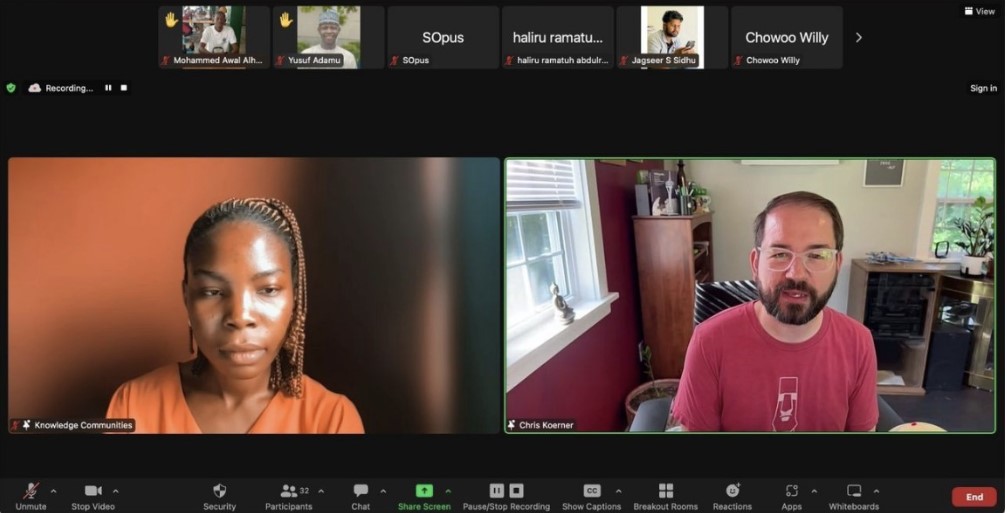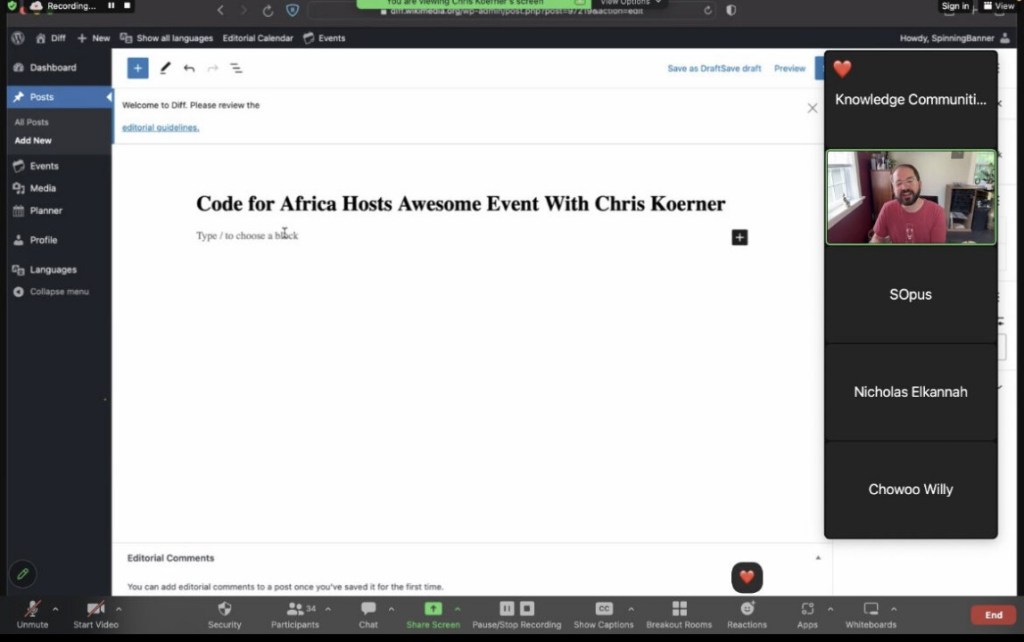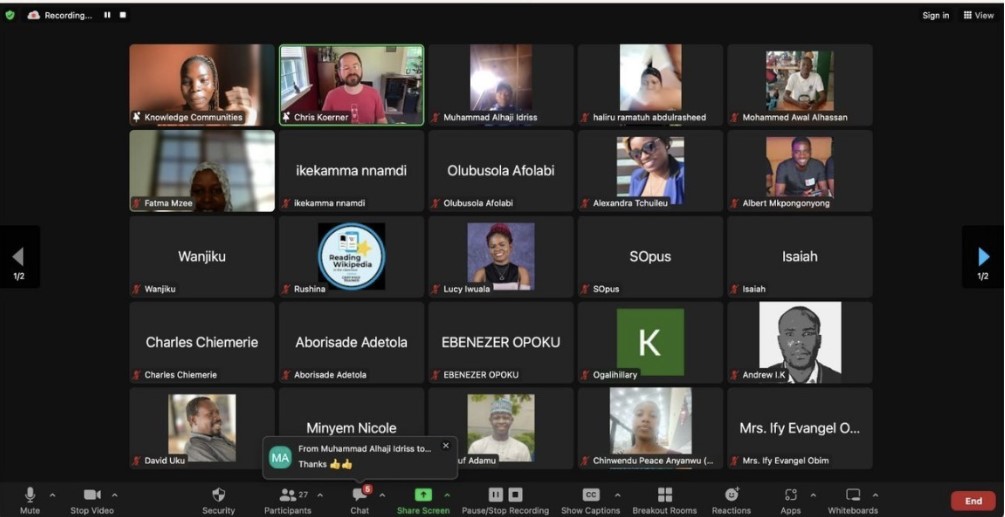Code for Africa (CfA) recently hosted its highly anticipated Wikimedian-in-residence (WiR) community bi-weekly webinar in July 2023. Guided by the theme “Unlocking The Power Of Compelling Storytelling: What The Diff?”, this webinar was a transformative event, facilitated by Bukola James, CfA’s WiR community coordinator. The session was further enriched by the presence of Chris Koerner, a Senior Movement Communications Specialist from the prestigious Wikimedia Foundation, who served as the guest trainer.



As part of the larger CfA WiRs initiative, this webinar aimed to empower African Wikimedians by honing their on-Wiki and off-Wiki skills, encompassing programmatic tactics, organisational proficiency, technical expertise, and evaluation prowess. The initiative has been diligently conducting a series of biweekly training webinars, and this particular event marked the first part of the series held on 06 July 2023, with an enthusiastic audience eager to embrace the wonders of compelling storytelling. The virtual webinar saw the convergence of 39 passionate members from CfA’s WiR Anglophone community, representing diverse countries including Ghana, India, Kenya, Mauritius, Nigeria, South Sudan, and Uganda. As the curtain fell on the first part of the webinar series, attendees eagerly marked their calendars for the much-anticipated webinar scheduled for July 20th, 2023.
The dynamic nature of the webinar fostered an environment of collaboration, learning, and inspiration, as participants delved into the art of storytelling on Wikimedia Diff and its potential to amplify the impact of their work on the Wikimedia platform. Specifically, it explored how to create compelling and engaging stories about Wikimedia activities carried out by Wikipedians, with the following learning objectives:
- Understanding the purpose and significance of a Wikimedia Diff.
- Navigating and exploring the Wikimedia Diff platform effectively.
- Identifying the key components and features of a blog post on Wikimedia Diff.
- Creating an engaging and informative blog post using the tools and guidelines on Wikimedia Diff.
- Utilising the formatting options to enhance the readability of the blog post.
- Proper citations and attributions of multimedia elements on Diff.
- Publishing and tracking statistics of reach and readership.
The aim of the session was to equip Wikimedians with practical skills and essential knowledge for effectively navigating and creating engaging, informative blog posts using the tools and resources available on Wikimedia Diff.
Let’s dive into the insights!
Introducing Wikimedia Diff
Our engaging discussion started with a brief introduction to Diff. As explained by Chris, Diff is a platform maintained by the Foundation’s Movement Communications Team that allows Wikimedia volunteers to share stories, updates, essays, and other movement-relevant content. Importantly, any member of our diverse community can contribute to Diff, and the platform is an excellent tool for bridging the communication gap within the community.
Glimpses into Readership and Authorship
In the webinar, Chris shared the detailed statistics about Diff’s readership and authorship between January and March 2023. It was discovered that Diff had garnered 73,698 visitors and 120,292 views during this period. That’s an average of 819 visitors per day, originating from almost every corner of the world! We also saw a significant increase in the number of email subscribers, which has now reached over 812. Regarding authorship, we discovered a total of 269 posts were published by 166 authors during the first quarter of 2023, which translates to about three posts per day. We were especially proud to see 40 of these posts available in languages other than English, allowing us to reach and engage a more diverse audience.
Creating a Lasting Impact: Strategies to Enhance Engagement
Chris highlighted some effective strategies to enhance engagement with audience on Diff:
- Identifying the audience’s interests and catering to them.
- Creating captivating headlines to attract readers.
- Choosing intriguing “featured” images to enhance the visual appeal.
- Using section headings instead of bold text for SEO benefits.
- Breaking longer posts into series to maintain reader interest.
Contribute, Connect, Create!
Chris further explained the process to contribute to Diff as follows: After logging in with an existing Wikimedia account, any Wikimedian can create a new draft and submit it for review. By creating a new draft on Diff, Wikimedians are contributing to Diff. It is important to note that the Movement Communications Team typically reviews and publishes the drafts within a few days of submission.
Innovation and Improvement
Diff is continually evolving to offer a better experience to its users. Chris shared some recent improvements, including an upgraded search function and several bug fixes. Future enhancements, like the capability to search across languages and filter events by region, are also on the cards.
Feedback and Concluding Thoughts
The event was a resounding success, with enthusiastic participation. Here are some inspiring words from our attendees:
- “An engaging session! It was great to be part of it.”… Ngozi Ogoke
- “This webinar was both informative and motivating. I am looking forward to contributing to Diff.”… Emeka Nwakpa
- “I learned so much about leveraging Diff for community engagement. Can’t wait to put these tips into action.”… Akosua Gyamfuaa
The webinar has created a sense of excitement among our community members and encouraged them to actively contribute to Diff. As we continue to enhance African representation on Wikipedia, platforms like Diff will play a significant role in fostering community connections and sharing inspiring narratives.
Links to the session recording are provided below:
WiR Anglophone July 2023 via Zoom
[Editors note: The Movement Communications team appreciated the invitation to talk about Diff to Wikimedian-in-Residence community. If you’d like to invite us to come talk to your community, please get in touch.]

Can you help us translate this article?
In order for this article to reach as many people as possible we would like your help. Can you translate this article to get the message out?
Start translation